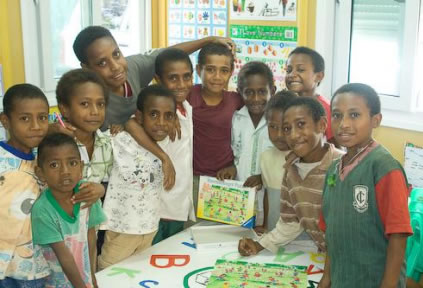
PNGAA Library
Buk bilong pikinini: Anne-Sophie Hermann

 For as long as I can remember, I have
loved books. I fondly recall my
childhood visits to the local library in Denmark, where I used to take out as
many books as I could load on to my
bicycle. When I became a mother, I
wanted to transmit this love to my daughter, and I read to her as often as I could.
For as long as I can remember, I have
loved books. I fondly recall my
childhood visits to the local library in Denmark, where I used to take out as
many books as I could load on to my
bicycle. When I became a mother, I
wanted to transmit this love to my daughter, and I read to her as often as I could.
I wanted this to continue when my husband took up his position as Australia's
High Commissioner to Papua New Guinea in December 2006. However, upon our
arrival, I learned that there were no bookshops*
or well-functioning public libraries
in PNG. Apparently, at Independence, there were thirty-two public libraries in
Port Moresby alone.
This prompted me to start a project, which has now become Buk bilong Pikinini. Since day one, the idea has been to provide access to books and getting books into the hands of children, as a first step to literacy. The idea slowly turned into a model for libraries, which have a strong focus on early childhood learning. I thought that from the start these ought to be set up in community-based localities, serving mainly the vulnerable children in the society who miss out on formal education.
Our first library is located at the Port Moresby General Hospital in the Children's
HIV, Tuberculosis and Malnutrition Ward and is instrumental in the children's
rehabilitation. The second library is at the RCSERC special needs school for
hearing impaired children, where we have also made sure that there are sign
language books and materials available. The remaining five libraries are next to
clinics, a police station, markets and settlements.
The process of setting up such a project has not been easy, but I have to say that at
the very least it has been extremely exciting. The tireless work of all the Buk bilong
Pikinini committee members combined with the commitment and financial
support of the local business community has enabled us to set up seven libraries to
date, with many more planned. In PNG of course a lot can happen: we have had
to close our Koki Markets library on a few occasions due to tribal fighting between
Taris and Goilalas, we have had our teachers in Goroka thrown into jail for trying
to prevent the son of a police officer from stealing a book, and have had trees fall on
our library at Six Mile: and the list goes on.
The most exciting part of the project has been the close contact I have been able to establish with the children coming to our libraries on a regular basis. Their stories are amazing and have touched me deeply. In Australia, we all take books and libraries for granted and most people have a number of books at home.
For children in PNG it is quite a different story: there are no books in the home, no libraries or bookshops and the school libraries mainly hold books from the 1960s and 1970s. But the children‘s thirst for learning is palpable. Most of our libraries cannot cater for the large number of children presenting themselves every morning for a literacy session. In Goroka, for example, we have more than 300 children lining up to get into a library which can only comfortably hold 100. The enthusiasm and the joy of the children eager to read the more than 2000 children's books we put in each library is an inspiration to be reckoned with.
We employ a minimum of two teacher-librarians at each library to conduct our literacy- and numeracy-based learning programme every morning, but our core business is really to read to the children and introduce them to books. I still get quite emotional every time I see a child holding a book for the first time.
With this project, we are hoping to encourage the PNG government to recognize
the importance of libraries: not just for providing access to books, but also for the
sake of preserving PNG's history through proper archiving of the nation's written
record.
More than 43% of school-aged children miss out on formal education in PNG and the literacy rate is officially around 56%. If you are able to somehow assist Buk bilong Pikinini in its efforts to try to increase literacy rates in PNG, please do not hesitate to contact me personally. I can be found most days in the office very kindly provided for me by the PNG High Commissioner to Australia, His Excellency Charles Lepani (a strong supporter of our efforts).
If you would like to hear and see more about Buk bilong Pikinini libraries, you can do so by viewing podcasts and reading stories about our up and coming libraries, by going to our website: www.bukbilongpikinini.org
If you would like to assist Buk bilong Pikinini in establishing libraries in PNG, we would be very grateful for financial donations, and cheques made out to Buk bilong Pikinini can be sent to me at the High Commission of New Guinea, 39-41 Forster Crescent, Yarralumla ACT 2600. Phone: 02 6129 1801 and 6273 3322
* Thanks to Dr John Evans, there is now a very well stocked book store at UPNG.